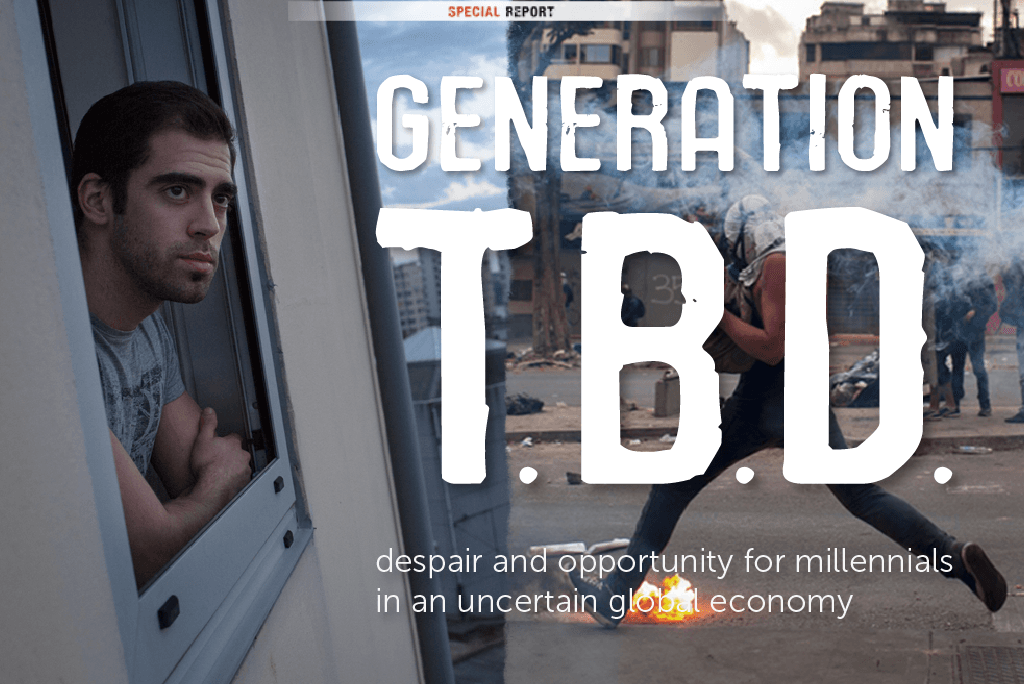How companies can help fix the youth unemployment crisis
NEW YORK— Global youth unemployment rates have hit near historic highs, with almost 13 percent of the world’s young adults currently unemployed. While being out of work challenges people of any age, it is especially devastating for “millennials,” young people ages 20–24 who would otherwise use their early work experiences to develop the marketable skills and nascent employment histories necessary to compete for future jobs.
Instead, unemployed millennials could pay for their early lack of work experience for years to come in the form of lower wages, fewer skills and reduced employment opportunities.
Consider, for example, the nearly 1 million millennial Americans who experienced long-term unemployment during the recent recession. They are projected to collectively lose over $20 billion in earnings over the next decade, or roughly $22,000 per person. This could make it that much harder for them to qualify for an affordable mortgage, save for retirement, or otherwise leverage the economic opportunities that can lead to their own financial stability and bolster the larger economy.
At the same time that millions of millennials are struggling to find work, employers across the United States and around the world are struggling to find qualified candidates to fill open positions. This skills gap, the mismatch between the necessary skills for a job and those of a prospective worker, manifests in different ways in various countries.
In the United States roughly 16 percent of young people ages 16-24 are unemployed, the World Bank estimates, though certain populations are worse off than others.
Approximately 12 percent of white young adults are out of work, as compared to 26 percent of black and 15 percent of Hispanic 20 to 24-year-olds. The disproportionate number of unemployed minorities is attributable, at least in part, to lack of access to higher education and quality jobs by low-income communities and communities of color.
While higher education is a demonstrated tool for improved employment prospects, it cannot be the only strategy. Today, only 7 percent of low-income students complete a bachelor’s degree. Even if that number were to somehow increase fivefold, it would still mean that more than half of low-income kids wouldn’t complete college.
There need to be other avenues for the millions of young adults looking to find a good job, earn a decent living and achieve the American promise that hard work is rewarded with a safe, secure, sustainable livelihood.
So how do we connect this young, robust pool of workers with the employers who have jobs they desperately need to fill? By identifying the types of skills required by the employer and providing millennials opportunities to acquire those same skills.
There are good jobs that do not require a college degree, such as radiology and phlebotomy technicians, and line workers in utility and energy industries. These positions offer steady, living wages. They also provide workers the chance to develop new skills on the job that can help them to ascend the career ladder or pursue additional education.
However, these jobs demand specialized skill sets that most millennials do not possess. And unlike in previous generations, when employers hired unskilled workers into entry-level positions, today’s firms provide less on-the-job training, preferring instead to hire someone outside the company who already has the needed skills.
But today’s employers can’t find workers with these skills, and millennials don’t know how to acquire them, so the jobs remain empty. This creates a significant opportunity to help young adults secure good jobs and assist employers to compete in the global marketplace.
To that end, JPMorgan Chase & Co. has created New Skills at Work, committing $250 million over five years to help shrink this global skills gap by helping job seekers secure the skills they need to meet employer demand. In the United States and around the world, we are supporting research about this skills gap in several cities and funding workforce partnerships that align the supply and demand.
We are using our expertise to fund efforts that identify business sectors, like healthcare and technology, facing the most acute skills gaps and the contributing factors unique to those industries. We are also supporting data-driven research about how education and training providers can make young people aware of these jobs, assist them to acquire the necessary skills and connect them to relevant employers.
Through conversations like the one taking place at International House on October 24-25, “Generation Jobless,” the right people are coming together to discuss and develop innovative models to close the skills gap on the ground in real time. Together, we’re developing demand-driven solutions that start with shrinking the skills gap by assessing employers’ needs and partnering with employers to design effective training programs.
Whether you’re a financial firm with clients around the world, a small business with a few employees or a community college, closing the skills gap is in your best interest. A growing, highly skilled workforce is good for households’ bottom lines and good for the communities where they live and work. Taken together, this is good for the economy here at home and around the globe.
Every day, reporters and producers at The World are hard at work bringing you human-centered news from across the globe. But we can’t do it without you. We need your support to ensure we can continue this work for another year.
Make a gift today, and you’ll help us unlock a matching gift of $67,000!
